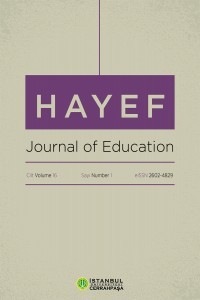EĞİTİMDE ÖLÇME VE DEĞERLENDİRME ÇALIŞMALARINDA WEB TABANLI UZMAN SINAV SİSTEMİNİN KULLANIMI ÜZERİNE BİR ARAŞTIRMA
uzman sınav sistemi, ölçme ve değerlendirme, çevrimiçi sınav, uzman sistem
A Research On Using a Web Based Expert Exam System in Measurement and Evaluation Studies in Education
___
- Alberico, R. & Micco, M. (1990). Expert systems for reference and information retrieval. London: Meckler.
- Arlı, M. ve Nazik, H. (2001). Bilimsel araştırmaya giriş. Ankara: Gazi Kitabevi.
- Ayas, A., Köse, S., & Taş, E. (2002, May). The effects of computer-assisted instruction on misconceptions about photosynthesis. In The First International Education Conference, Changing Times Changing Needs, Eastern Mediterranean University, Gazimagusa-Northern Cyprus.
- Bahar, M., Nartgün, Z., Durmuş, S. ve Bıçak, B. (2006). Geleneksel-alternatif ölçme değerlendirme teknikleri öğretmen el kitabı. Ankara: Pegem A Yayıncılık.
- Balcı, A. (2005). Sosyal bilimlerde araştırma. Ankara: Pegema Yayıncılık.
- Balcı, E. ve Tekkaya, C. (2000). Ölçme ve değerlendirme tekniklerine yönelik bir ölçeğin geliştirilmesi. Hacettepe Üniversitesi Eğitim Fakültesi Dergisi, 18, 42-50.
- Buzzetto-More, N. A., & Alade, A. J. (2006). Best practices in e-assessment. Journal of Information Technology Education, 5(1), 251-269.
- Çepni, S. (2003). An analysis of university science instructors’ examination questions according to cognitive levels. Educational Sciences: Theory and Knowledge, 3(1), 78-84.
- Çepni, S., ve Azar, A. (1998, Eylül). Lise fizik sınavlarında sorulan soruların analizi. III. Ulusal Fen Bilimleri Eğitimi Kongresi, 109-114.
- Cohen, L., Manion, L., & Morrison, K. (2000). Action research. Research Methods in Education, 5, 226-244.
- Demirli, C. (2007). Elektronik portfolyo öğretim sürecinin öğrenen tutumlarına ve öğrenme algılarına etkisi. (Yayınlanmamış doktora tezi, Fırat Üniversitesi, Elazığ, Türkiye).
- Emir, Ş. (2006). E-öğrenmede sınav modelleri ve uygulaması. (Yayınlanmamış yüksek lisans tezi, İstanbul Üniversitesi, Fen Bilimleri Enstitüsü, İstanbul).
- Erdem A. R. (2005). Öğretim teknolojisi ve materyal geliştirme. İstanbul: Lisans Yayınevi.
- Ertkin, E. (1993). Geleneksel ölçme kuramına alternatif iki yöntemin tanıtılması ve personel seçimini yönelik uygulama çalışması. (Yayınlanmamış doktora tezi, İstanbul Üniversitesi, Sosyal Bilimler Enstitüsü, İstanbul).
- Haque, M. S. (2000). Application of artificial intelligence in construction management. http://osp.mans.edu.eg/elbeltagi/AI%20Introduction.pdf Erişim Tarihi: 10.11.2013.
- Hart, A. (1986). Knowledge acquisition for expert system. London: Kogan Page.
- Harvey, J., & Mogey, N. (1999). Pragmatic issues when integrating technology into the assessment of students. In S. Brown, P. Race, & J. Bull (Eds.), Computer-assisted assessment in higher education (pp. 7-20). London: Kogan-Page
- Jackson, P. (1990). Introduction to expert systems (2nd ed.). Wokingham: Addision-Wesley.
- Kabakçı, İ. ve Karakaya, Z. (2003). Web’de öğrenme ölçme ve değerlendirme. Ankara: Türkiye Bilişim Derneği.
- Lynch, K. and Goold, A. & Blagn, J. (2004). Students' pedagogical preferences in the delivery of IT capstone courses. Journal of Issues in Informing Science and Information Technology, 1, 431-442.
- Özçelik, D. A. (1998). Ölçme ve değerlendirme. Ankara: ÖSYM Yayınları.
- Pickard, M. J. (2007). The New Bloom’s taxonomy: an overview for family and consumer sciences. Journal of Family and Consumer Sciences Education, 25(1), 45-55.
- Rgford, D. V., & Baur, G. (1990). Expert systems for business: Concepts and applications. Boston: South-Western Publishing Company.
- Robbins, A. (1995). İçindeki devi uyandır. (Çev. B. Ç. Dişbudak). İstanbul: İnkılâp Yayınevi.
- Şahinel, S. (2002). Eleştirel düşünme. Ankara: PegemA Yayıncılık.
- Savage, L. B. (1998). Eliciting critical thinking skills through questioning. The Clearing House, 71(5), 291-293.
- Talim Terbiye Kurulu Başkanlığı. (2016). Madde yazımı ile ilgili rapor. http://talimterbiye.mebnet.net/program-gel-birimi/Soru%20Analizleri-%20Rapor.pdf Erişim Tarihi: 15.4.2016.
- Turgut, M. F. ve Baykul, Y. (2012). Eğitimde ölçme ve değerlendirme. Ankara: Pegem Akademi.
- Uysal, Ö ve Kuzu, A. (2011). Çevrimiçi eğitimde kalite standartları: Amerika örnekleri. Anadolu Journal of Educational Sciences International, 1(1), 49-74.
- van Zee, E. H., Iwasyk, M., Kurose, A., Simpson, D. & Wild, J. (2001). Students and teacher questioning during conversations about science. Journal of Research in Science Teaching, 38(2), 159-190.
- Yıldırım, A. ve Şimşek, H. (2005). Sosyal bilimlerde nitel araştırma yöntemleri. Ankara: Seçkin Yayıncılık.
- Başlangıç: 2004
- Yayıncı: İstanbul Üniversitesi-Cerrahpaşa
FEN VE MATEMATİK ÖĞRETMENLERİNİN BİLİMSEL MODEL HAKKINDAKİ GÖRÜŞLERİNİN İNCELENMESİ
Ela Ayşe KÖKSAL, Hülya YILDIRIM
İlkim Ecem EMRE, Elif KARTAL, Sevinç GÜLSEÇEN
Nilgün YENİCE, Barış ÖZDEN, Gizem ALPAK TUNÇ
İrfan ŞİMŞEK, M. Erdal BALABAN, Hatice ERGİN
ÖĞRETMEN ADAYLARININ WEB PEDAGOJİK ALAN BİLGİSİNE İLİŞKİN ÖZ-YETERLİK ALGI DÜZEYLERİ
AYTÜL AKAL’IN “SÜPER GAZETECİLER” ÇOCUK SERİSİNDE “ABARTILMIŞ MERAK”
